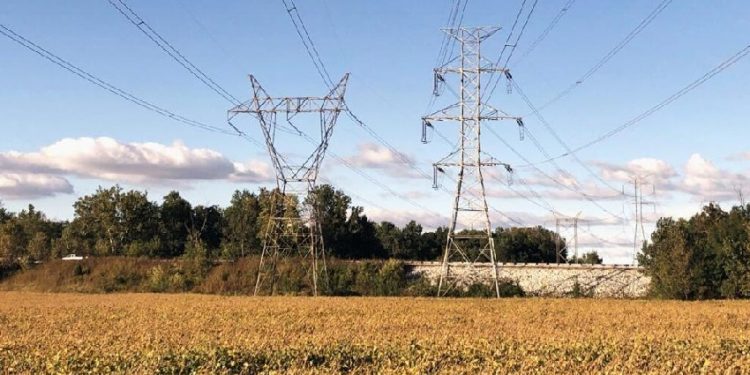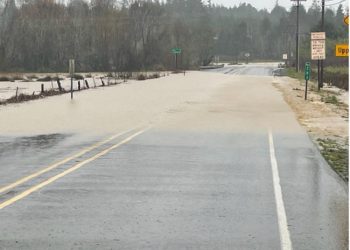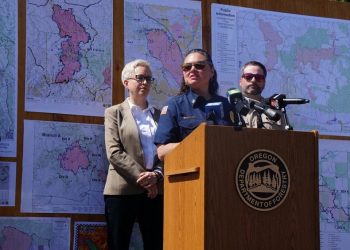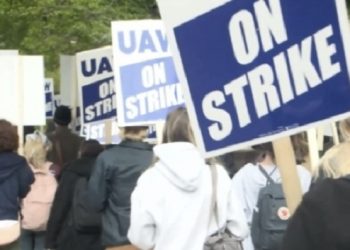Astoria, OR – Oregon lawmakers on Tuesday introduced an amendment to House Bill 3666, a measure designed to strengthen wildfire mitigation practices by electric utilities. The change was made in response to concerns that the bill’s original language could inadvertently grant utilities immunity from lawsuits if their equipment caused wildfires.
The amendment, which alters a single sentence in the bill, clarifies that the wildfire safety certificate issued by the Oregon Public Utility Commission (OPUC) only confirms that utilities have met the commission’s wildfire safety standards at the time of certification. It does not, as some critics feared, establish that utilities have “acted reasonably” in preventing wildfires, which could have been interpreted as providing legal protection from liability.
The bill, initially proposed by Rep. Pam Marsh, D-Ashland, aims to set clear standards for wildfire prevention and establish a certification process for electric utilities. Supporters argue the measure is necessary to ensure that utilities take proper precautions to prevent wildfires, which have become an increasing threat in the state, particularly after the devastating 2020 Labor Day fires.
However, critics, including legal experts and representatives from the timber industry, expressed concern that the original wording of the bill could be interpreted as giving utilities an unfair advantage in lawsuits. They pointed to the 2020 Labor Day fires, which killed 11 people and destroyed thousands of homes, as a tragic example of the potential for utility negligence. In 2023, a Multnomah County jury found PacificCorp, the parent company of Pacific Power, guilty of recklessness and negligence in a class-action lawsuit over the fires and awarded millions in damages. To date, the company has agreed to or been ordered to pay over $1 billion in settlements.
The amendment addresses these concerns, with Rep. Marsh assuring lawmakers that it was never the intent of the bill’s sponsors to offer utilities immunity in the event that their equipment causes a wildfire. Legislative attorneys had previously assured her that the original version would not provide such protection, but some attorneys disagreed with this interpretation, prompting the amendment.
The revised bill now clearly states that the certification simply confirms that the utility has implemented wildfire mitigation policies in line with state standards at the time the certificate is issued. This clarification has been hailed as an improvement by some of the bill’s critics, although concerns about the bill’s overall effectiveness in holding utilities accountable remain.
While the amendment addresses some of the liability concerns, other stakeholders, including the Oregon Trial Lawyers Association, are still wary of the bill’s ability to ensure proper enforcement. Cody Berne, an attorney with the association, argued that the bill does little to strengthen the Oregon Public Utility Commission’s ability to investigate and audit utilities for compliance with wildfire safety standards. He expressed concern that the bill simply recycles existing fire safety regulations without providing the necessary resources to ensure they are being followed.
“If the goal is safety, this bill won’t accomplish it,” Berne said. “There are no resources to investigate and make sure that investor-owned power companies are following the rules. The bill just gives the appearance of safety.”
Supporters of the bill, including utility managers, argue that setting clear statewide standards is critical for guiding utilities in their efforts to reduce wildfire risks. Keith Brooks, general manager of Douglas Electric Cooperative, emphasized that having established standards would help utilities make informed investments in wildfire mitigation and avoid skyrocketing rates for consumers.
“Without some sort of certification process, I’m telling you as a utility manager, that will drive prices so high that people will not be able to afford to live in the communities that we’re all trying to protect,” Brooks said.
While the amendment has made the bill more palatable to some critics, the issue of enforcement remains a key point of contention. Survivors of the 2020 Labor Day fires, such as Sam Drevo, have expressed frustration that the Oregon Public Utility Commission has not conducted a formal investigation into the causes of the fires or released a comprehensive report on the events.
“We’re entering the fifth year since the fires, and there’s still no report,” Drevo said, urging lawmakers to ensure that the commission has the authority and resources needed to hold utilities accountable.
As House Bill 3666 moves forward, it is clear that while the amendment has addressed some of the immediate concerns about utility liability, ongoing debates about the bill’s effectiveness in preventing future wildfires and ensuring proper enforcement will likely continue.













